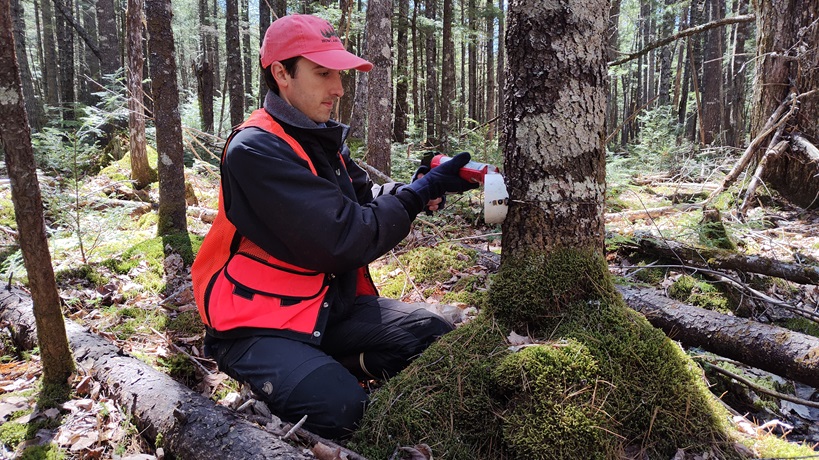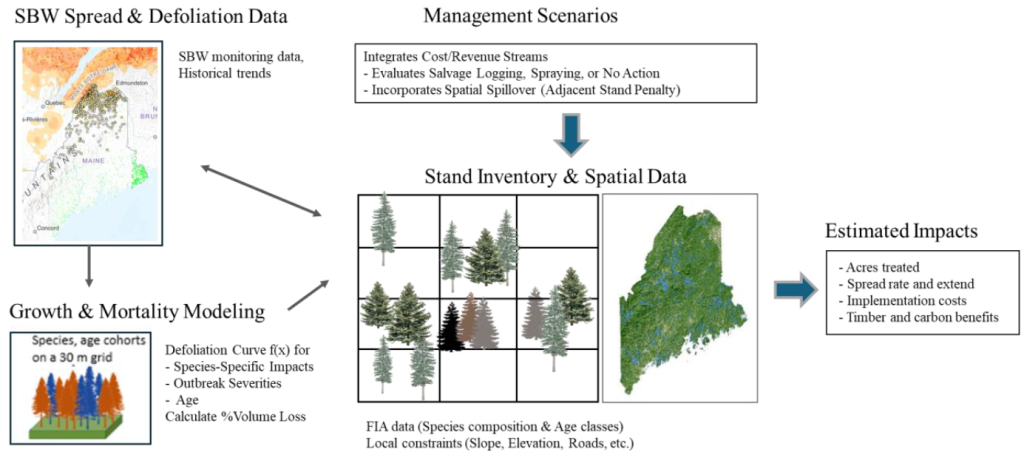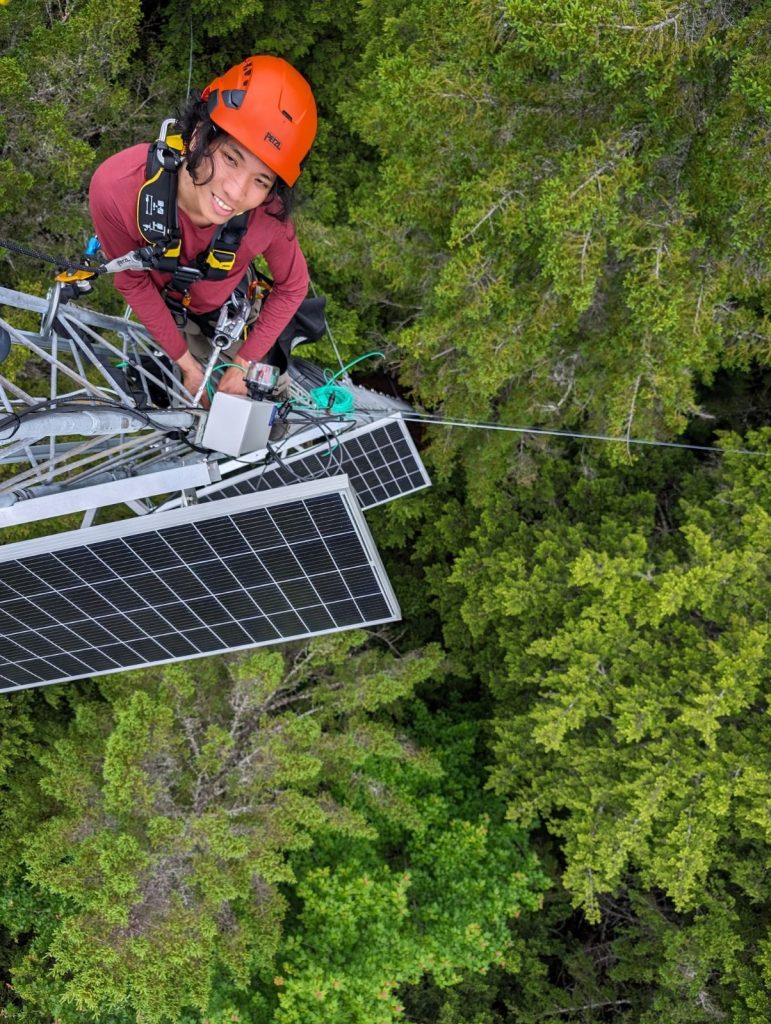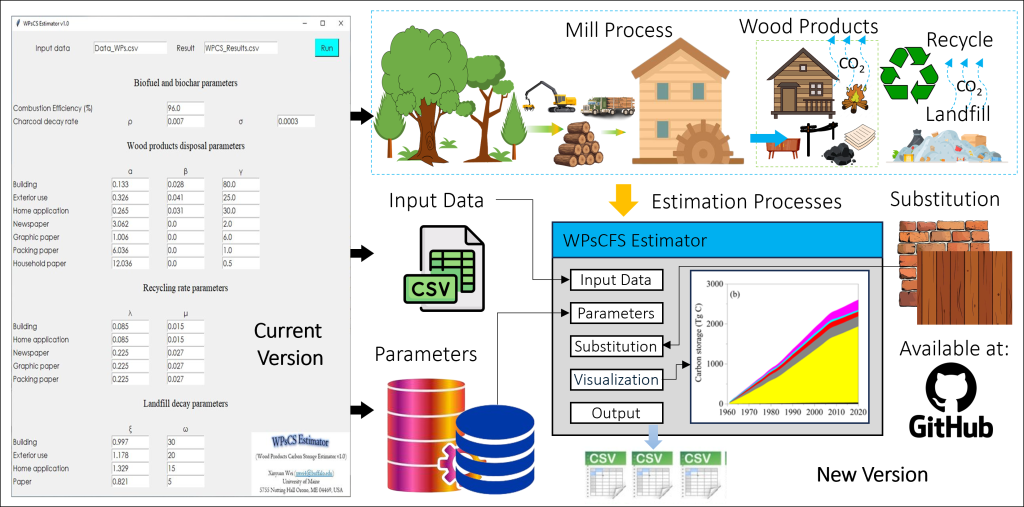
NSRC Awards Maine Researchers Over Half a Million Dollars to Support Applied Forest Science
Sustaining the Health of the Northern Forest
Orono, ME — Northeastern States Research Cooperative (NSRC) Directors are pleased to announce 11 grants totaling nearly $2.2 million of federal funding and close to $1 million of matching funding for research that will focus on areas of concern identified by forest stakeholders in the Northern Forest region: Community and Economic Resilience, Decision Support and Management Tools, Forest Health and Resilience, and Social Science for Effective Public Engagement. Three of the NSRC projects will be led by faculty in the University of Maine School of Forest Resources (SFR).
“The Northeastern States Research Cooperative plays an essential role in advancing forest science and supporting sustainable forestry across Maine. As Ranking Member of the House Appropriations Interior Subcommittee, I’m proud to have helped secure funding for NSRC, and I’m especially glad to see the University of Maine leading the way on research that supports our forest economy, strengthens forest health and resilience, and empowers landowners. These investments in forest carbon, pest management, and next-generation wood products will deliver real-world solutions for Maine’s working forests.”
U.S. Representative Chellie Pingree

A team of SRF researchers led by Adam Daigneault, Director and EL Giddings Associate Professor of Forest Policy & Economics, will evaluate species distribution changes, biomass shifts, and carbon stock dynamics to develop a spatial decision framework to optimize spruce budworm (SBW) management that will allow land owners and managers to make informed decisions to optimize economic value, enhance forest health, and improve overall resilience to SBW. PI Daigneault is enthusiastic about a project that will provide “[T]he opportunity to develop and share knowledge and tools to help address a current, real-world issue: the emerging spruce budworm outbreak in the Northern Forest.”

Associate Professor of Forest Ecology Shawn Fraver will lead a multi-institutional effort that will use forest inventories, CO2 flux data, LiDAR-derived biomass estimates, and carbon projection models to provide a comprehensive assessment of the carbon consequences of partial harvests. Fraver shared that he is “excited about working with the diverse team of practitioners and researchers we have assembled to address a topic — carbon consequences of partial forest harvesting — of national significance.

Assistant Research Professor Xinyuan Wei and colleagues will work with USFS and Maine Forest Service partners to develop an advanced wood products carbon flow and storage estimator tool that can be used by forest stakeholders to make informed decisions that balance forest ecological sustainability with economic goals. “Building on our current Wood Products Carbon Storage (WPsCS) estimator,” explained Wei, “this project will support the development of the next version. It will also provide an opportunity to collaborate with stakeholders and guide the direction of future improvements.”
The NSRC 2024 general Request for Proposals elicited a strong response from regional researchers; NSRC received 50 project proposals requesting more than $11 million in funding. All proposals were evaluated by two technical reviewers with specific expertise in relevant science and public outreach. The NSRC Executive Committee advanced the 26 highest ranked proposals for evaluation and review by the external full proposal review panel, made up of state and private forestry professionals in the region.
Funding awarded to project investigators in Vermont, New Hampshire, and New York will cover research into overstory and understory factors influencing tree growth, broad-scale and species-specific conservation approaches, sustainable packaging materials from forest-derived biopolymers, selective cutting and forest biodiversity, tree species and forest reforestation, and management practices to reduce soil disturbances.
“The University of Maine continues to play a key role in conducting research that directly supports our state’s forest products industry and natural resources. These newly funded projects, focusing on managing the threat of spruce budworm and improving our understanding of forest carbon, will provide valuable data for stakeholders and policymakers. I’ve long supported funding for the NSRC through my role on the Senate Appropriations Committee, and I’m glad to see it continuing to support research that benefits the State of Maine.”
U.S. Senator Susan Collins
The majority of the projects include collaboration with US Forest Service Northern Research Station scientists, as well as researchers from throughout the region. Project investigators come from nine colleges and universities, one federal agency, and one nonprofit organization.
“These research projects are possible because of the strong collaboration between the USDA Forest Service Northern Research Station and the Northeastern States Research Cooperative. Together, the Forest Service and partners continue to advance actionable science with user-friendly products that support forest health,” said Cindi West, director of the USDA Forest Service Northern Research Station. “Investments like these grants make America’s wood products and energy economies more competitive, promote global exchange of knowledge, and aid land managers, communities, and industries that rely upon our forests’ health and productivity now and into the future.”
NSRC also manages the Indigenous Forest Knowledge Fund (IFKF) program to support traditional ecological knowledge (TEK) for Indigenous communities alongside other applied forest research. The program supports the education and training of Indigenous youth in forest-related TEK, new applied forest research that advances Tribal priorities, as well as the synthesis and translation of forest research to advance outreach and economic programs for Tribal Nations and Indigenous communities. An RFP for the 2025 IFKF competition, with $2.1 million in funding available, was released in early May (www.nsrcforest.org/indigenous-forest-knowledge-fund).
The following research projects, led by researchers from all four states, will begin in 2025:
- Investigating the Decoupling of Overstory and Understory Trees and Drivers of Forest Regeneration Dynamics in the Northern Forest. PI Eddie Bevilacqua, SUNY College of Environmental Science and Forestry.
- Restoration and Climate Adaptation Potential of Red Spruce in Northern Forests. PI Peter Clark, University of Vermont.
- Integrating Ecology and Economy: A Spatial Optimization Framework for Spruce Budworm (SBW) Management. PI Adam Daigneault, University of Maine.
- Quantifying Forest Carbon Pools and Fluxes Following Partial Harvest in Northern Conifer Forests. PI Shawn Fraver, University of Maine.
- Understanding the Landscape for Species of Greatest Conservation Need by Uniting Coarse- and Fine-filter Strategies for Conservation. PI Brian Kron, Vermont Center for Ecostudies.
- Eco-Friendly Packaging Innovations: Developing Biocomposites from Nanocellulose, Polyhydroxybutyrate, and Lignin Obtained from Forest Biomass. PI Deepak Kumar, SUNY College of Environmental Science and Forestry.
- Power in the Patchwork? Enhancing Biodiversity and Resilience by Using Summertime Patch Cutting to Create Uneven-Aged Northern Forests. PI Stacy McNulty, SUNY College of Environmental Science and Forestry.
- Trialing Best Management Practices for Preserving or Extending Frozen Ground Conditions during Winter Harvesting Operations. PI Steven Roberge, University of New Hampshire.
- Just How Hard Is it Raining? PI Jamie Shanley, U.S. Geological Survey.
- Forest Management at the Frontline: Silviculture and Belowground Ecology Drive Responses to an Imminent Invasion of Adelges tsugae. PI Kurt Smemo, Skidmore College.
- Next-Generation Wood Products Carbon Estimator: A Tool for Comprehensive Stakeholder Collaboration and Decision-making. PI Xinyuan Wei, University of Maine.
About the Northeastern States Research Cooperative
NSRC (https://nsrcforest.org) is a competitive grant program for Northern Forest research, authorized by Federal legislation (Public Law 105-185), with allocations to the program directed by the USDA Forest Service. Since its inception, the NSRC has funded more than 345 projects, engaging 50 different institutions, agencies, and organizations across the northeast. Federal funding comes from Congressional appropriations through a partnership with the research and development arm of the USDA Forest Service. The private sector, states, and other organizations offered matching funding to support the research on the Northern Forest and its 26 million acres in Maine, New Hampshire, New York, and Vermont.
NSRC is jointly directed through the U.S. Department of Agriculture Forest Service’s Northern Research Station and a designated institution in each of the four Northern Forest States (Rubenstein School of Environment and Natural Resources at the University of Vermont, the University of New Hampshire in cooperation with the Hubbard Brook Research Foundation in New Hampshire, the Center for Research on Sustainable Forests at the University of Maine, and the State University of New York College of Environmental Science and Forestry). These institutions are all equal opportunity providers.
Media Contacts
Maine: Meg Fergusson margaret.fergusson@maine.edu
New York: Mary Beth Malmsheimer mmalmshe@esf.edu
New Hampshire: Benjamin Fraser benjamin.fraser@unh.edu
Vermont: Anna Marchessault anna.marchessault@uvm.edu
